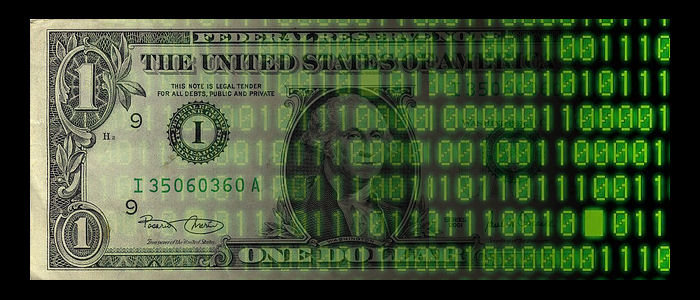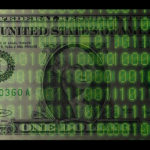Why citizens have a right to an anonymous currency …

A brief insight into the origin of the money crisis
What is a currency? The German word for currency originates from the verb ‘to grant’ with the meaning of ‘to guarantee’. The present-day meaning goes back to ‘guaranteeing of the content of the coin’. But what is guaranteed?
If you come to our bank, we will redeem it for your gold again.
In 1880 the so-called gold standard (also called gold currency) was introduced. The currency consisted of gold coins and bank notes, which represented the entitlement to gold and could always be exchanged for gold. After the outbreak of World War I, many states, which were bound to this, abandoned the exchange. The consequence was a money crisis, which eventually led to the USA being the first to suspend the gold standard in order to counteract deflation and to help the economy to grow again.
In 1971, US President Nixon ultimately removed the bond of the US dollar to gold. Thus the system failed, because in the meantime there were more coins and notes in circulation than gold could be guaranteed for. Today, some states still keep gold reserves. The gold value of the currency can, however, no longer be guaranteed. A one-kilo gold bar can hide up to 40,000 Euros; but, despite this, the value is physically not covered. The only coverage is our psychology. Concerning this, there are two thought experiments:
Thought experiment No. 1:
I have a pen. What is the value of such a normal pen? Perhaps approx. 50 cents at the check-out in the supermarket. But if I say that this pen belonged to Michael Jackson, and if I can also prove this – what then? At an auction it can suddenly be worth millions.
Thought experiment No. 2:
Paper money: US dollar bank notes. A 20-note and a 100-note. What is this in a physical sense? A piece of paper. One is equal to the other. During production, hence when printing, the colours have an equal value. These two bank notes, as physical objects, have the same value. We now add the factor of psychology and we agree that the 100-note is five times more valuable than the 20-note. That is how money works! Psychology: the social aspiration, the stock market speculation. Considered from a psychological perspective, people believe that one object is worth more than another.
Between democracy and capitalism
Ever year the Forbes magazine draws up a list of the richest people (upfront is still Bill Gates). These people should make up the one percentage of the worldwide population who overall own more property than the remaining 99%. In 2011, this was also declared by the global movement, ‘Occupy Wall Street’. The point is that democracy is undermined with money, whereby banks control the cash flows from above, and the democratic involvement of those citizens who only have little to no money is prevented. The idea should combat capitalism, which was brought to the world through corruption by lobbyists and other backers.
Most governments heard the protests, in the USA even pacified. Fact: because more digital than physical money is in circulation, everything is gradually “outsourced” to the internet and, as a result, the anonymity of every single citizen is slowly undermined. Otherwise, some could have many coins and notes hidden in a sock at home. The currency slowly transforms into a point system, similar to “Super Mario”.
The right to an anonymous currency
Sweden, our political model country, was one of the first countries, in which the police announced:
Cash is suspicious. If somebody owns cash, this could fall into the area of the shadow economy (or better known as the black market). Or organised crime. Whoever owns cash is a potential terrorist, so we will abolish cash.
We only know such scenarios from movies in which bankers (e.g. The Wolf of Wall Street) transfer everything officially via banks, only mafiosi carry suitcases full of cash with them.
Furthermore, Big Data comes into play during purchases which are paid for with plastic money. Because algorithms, which customise suitable products for customers, can achieve a little more. The USA demonstrate this once again:
In 2014 an incident occurred in Minnesota in a branch of the supermarket chain, Target. This supermarket chain invented the ‘pregnancy prediction value’ without considering that an approach like this could have an enormous influcence on family life.
One day, advertising, in which baby products were promoted, was sent to a household, addressed to the 16-year-old daughter. The father got hold of this. The father, furious, went to the supermarket and insulted the staff of the the Target branch, asking how they got the idea of offering baby products to his daughter. How could this happen? On the basis of consumer behaviour of women, this algorithm can determine whether or not they (with a certain probability) are pregnant and namely, by monitoring the following factors:
- An automatic registration at a baby gift service
- Most pregnant women buy unscented lotions after the third month of pregnancy…
- … and a few weeks later special nutritional supplements.
- As the pregnancy continues, a uniformed pattern is noticeable.
The result:
The supermarket chain then consequently concluded the presumed date of birth and created a product list, which, so to speak, should serve as an early warning signal for pregnancies among customers.
After a visit to the doctor it turned out that his daughter was actually pregnant. In the end, the father apologised to the Target branch.
Something similar could happen if customers unknowingly buy certain products, which could serve as the raw material for drugs or bombs. Scenarios like this are in the movie ‘Minority Report’.
The abolition of cash and the associated necessity of using cash dispenser cards or credit cards violates two articles of the Universal Declaration of Human Rights:
Article 11 – Right to the presumption of innocence
- Everyone charged with a penal offence has the right to be presumed innocent until proven guilty in a public trial, at which he has had all the guarantees necessary for his defence.
- No one shall be held guilty of any penal offence on account of any act or commission which did not constitute a penal offence, under national or international law, at the time when it was committed. Nor shall a heavier penalty be imposed than the one that was applicable at the time the penal offence was committed.
And:
Article 12 – Right to privacy
No one shall be subjected to arbitrary interference with his privacy, family, home or correspondence, nor to attacks upon his honour and reputation. Everyone has the right to the protection of the law against such interferences or attacks.
If payments are made exclusively with plastic money, highly sensitive data, such as health data, purchasing behaviour, etc. could, as a result of security gaps or targeted trade in data, fall into the wrong hands. This can lead to discrimination at the workplace, to a prejudgement such as, e.g. money laundering or even to social ostracism.
As a citizen, you have the right to make use of anonymous payment transactions. The following tips should thereby be borne in mind:
- Always pay with cash, where ever possible.
- Do without customer cards
- If you cannot avoid plastic money completely, organise prepaid cards.
- Make no private transactions via online banking.
- Avoid online purchases or use anonymous platforms.
Credits
| Image | Title | Author | License |
|---|---|---|---|
 |
From Cash To Digital | FamZoo Staff | CC BY-SA 2.0 |
